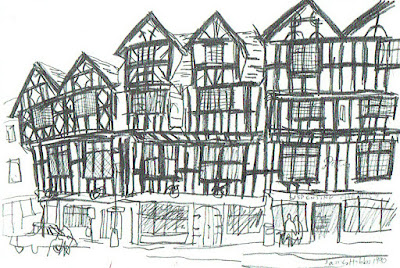Thirty years ago, in early 1990, I bought a camper van, packed it with homemade sketchbooks and pencils and, funded by £40 a week from Margaret Thatcher's enterprise allowance scheme, set off around the country for six months retracing the route of an old travel book I'd found in a car boot sale: HV Morton's In Search of England. Once home, I wrote about my experience, exhibited drawings completed on the trip, found a literary agent, and saw a parade of the UK's top publishers politely turn it down.
What since? While most of the 900 drawings have been kept safely in cardboard boxes and occasionally shared online (a selection of them were exhibited at Wolseley Fine Arts, London, in 1996), the 50 chapters have been archived in a series of devices that tell a story of technology since that time. The book was started on a typewriter, completed on an Amstrad and stored on floppy disks, and then passed through a succession of Apple Macs to laptops, the cloud and hard drives, and now to this blog. Over the coming months, to mark the 30 years since I started the journey, I'll be posting chapters from it along with the drawings.
 |
| Ludlow's Boots |
An admission: these chapters were written and the drawings were done by a man half my age, and the person I am now would do things differently. My story has been given a gentle edit, but I have resisted changing things too much. It represents where I was during those six months. There are parts I wince at, but they survive.
Morton has fared even worse over time. The truth about the hugely popular travel writer, who died in South Africa in 1979, was revealed in Michael Bartholomew's In Search of HV Morton, published in 2004. The way Morton portrayed himself in his books was a carefully constructed work of fiction. There were plenty of warning signs about his character that I became aware of as I followed his route, but I hadn't expected to him to turn out to be the racist, adulterous, hypocritical Nazi-sympathiser that Bartholomew's book reveals him to have been. But, ugly as we can now recognise Morton as being, that too has become part of the story of my journey.
My drawings, only some of which are included in these posts, were done at a formative time of my artistic career. Although I had just come through four years of art education at Hastings College of Arts and Technology and Winchester School of Art, those six months of constant drawing around England saw my work evolve almost beyond recognition. Again, I have kept in some of those early, clunking images, because they too are part of the real story.
My trip in the van was delayed for a while because of its hideous unreliability and, particularly, a faulty water pump. The date I started my journey, 24 April 1990, was noteworthy in a couple of ways. On that very day, at the Kennedy Space Center, Florida, the Hubble Space Telescope was launched on its own long-term mission to send back to Earth images from the corners of the cosmos, a role it is expected to continue until at least 2030. With humbler technology and a more terrestrial focus, my Fiat 850T camper van trip also started sending back a series of images, except these were images drawn in pencil and from such other-worldly locations as fields near Hereford, front gardens in Bradford-on-Avon and lorry parks in Lincoln.
Read on: Following Morton: the 1990 introduction
You can also follow me, and see more of my drawings, on Instagram.
• The second – and more personally significant – way that the date of my launch around England is worth remembering is that ten years later to that very day, 24 April 2000, my elder brother Dave died of cancer. I have a photo of him with his head under the bonnet of the van that I'll post if I can ever find it.








